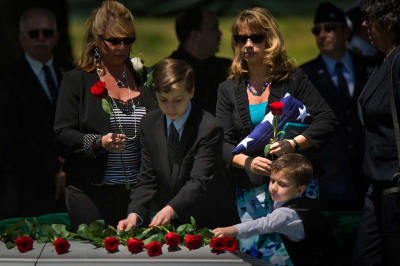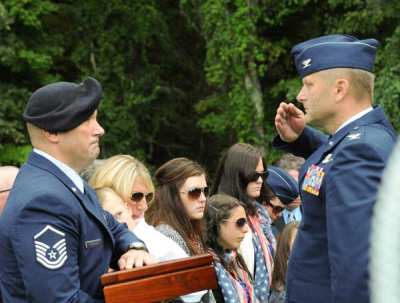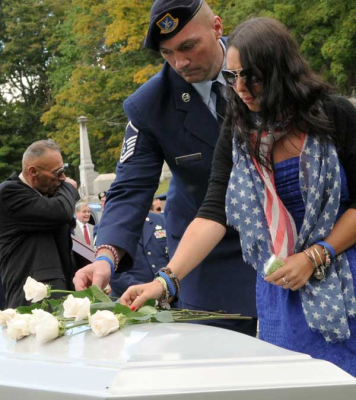The True Consequence of War Demands Generations of Profound Loss
When the casualty notification team arrived at the door down the street, you dropped everything, and in a blinding rush toward her, saw that she was in the car in her driveway, the ignition on and her eyes fixed forward on infinity. Her son was strapped into the backseat, mercifully asleep. Others converged quickly and took him away.
You joined her in the front and two other friends took places in the back. She could not talk. She could not breathe. She could not walk. For hours. The brutality of eternity was at her door. It was right there. You vowed to make it wait, even though you knew eternity was a patient master. You hated it for that.

Family members pay respects during the graveside interment ceremony at Arlington National Cemetery for four sailors who were killed during the Vietnam War when their SH-3A Sea King helicopter was shot down July 19, 1967 over Ha Nam province, North Vietnam. Photo by Mass Communication Specialist 2nd Class Todd Frantom, courtesy of the Navy.
When she wore white and something borrowed, she didn’t know about the deployments, the missed anniversaries and birthdays, or the horrendous hours. She most certainly did not know about this day. They both took vows, but he also took an oath, and that made for a crowded life.
Now, she would forever pay the cost of war. In an instantaneous flash of violence, the hopes and dreams they’d woven vanished in the dirt 5,000 miles from home. An endless, pounding ache would replace a longing for better days.
The weight of this moment was immense. The silence deafened you; the tears consumed you; the hand you held was cold, cramped, and crooked with pain. It didn’t feel like hers.
As you sat there, the perversion of guilt sought you out, as you silently thanked God that you were not the one in that driver’s seat and that it was not your son who’d been taken from that car. You pushed these thoughts out of your mind, but they came screaming back at you, over and over again.
At the memorial service, I sat and prayed, and I even spoke. Loss was part of who we were and what we did. My words, no matter how heartfelt, could never capture the debt we owed her and so many others who would never leave her side.
I presented the flag. I had presented a dozen flags. I leaned in close and almost whispered to her. I looked into her eyes and saw the blackness that comes from profound pain. I tried to understand how she felt. I expressed gratitude on behalf of a grateful nation. There was a precision to it—a purpose, sharpness, and finality to the ceremony.
I saluted the flag and saw that you were behind her, holding her son. I moved on and left the rest for you.

Air Force Col. Timothy LaBarge, right, commander of the 105th Airlift Wing, New York Air National Guard, salutes Master Sgt. Todd Lobraico Sr., assigned to the 105th Security Forces Squadron, during burial services for his son, Staff Sgt. Todd J. “T.J.” Lobraico Jr. Lobraico was a security forces specialist with the 105th Security Forces Squadron who was killed in action outside Bagram Airfield, Afghanistan, on Sept. 5, 2013. Photo by Tech Sgt. Michael O’Halloran, courtesy of the Air National Guard.
Now, 12 years removed from my 29-year career, with so many stories of moms, dads, husbands, wives, brothers, and sisters impacted by war and conflict swirling in my mind, I think I finally understand something I wish I understood on my first day, and it is this: The true consequence of war surrounds us, and payment in full demands generations of profound loss. I confess that sometimes I wish those most willing to push us into war could feel that sting.
For so many families, war felt like falling into a deep pond, where they struggled to stay above water. Searching the shore for friends, they quickly discovered their friends, too, struggled in their own deep ponds. They gasped for air and screamed, but nothing came out. Words swallowed like flames in gasoline. It was maddening.
As difficult as deployments were, returning home was often even more so because those who left came back changed. Life was not meant to be started and stopped so abruptly. Every day that passed brought them another day closer to the next deployment. Everyone knew caution would make it easier to say goodbye when the next void came.
Award-Winning Journalism in Your Inbox
When the next deployment did arrive, maps came out again, with pins stuck in distant places. There were photos and colorful and inventive countdowns. Somehow, according to a pamphlet or briefing, these things would help explain the inexplicable.
Some set plates for dinners that went uneaten, while others sketched family portraits from photos and created new dreams from quick calls, emails, and letters. For others, none of these things helped.

U.S. Air Force Master Sgt. Todd Lobraico Sr. with the 105th Security Forces Squadron, New York Air National Guard, places a rose on the coffin of his son, Staff Sgt. Todd J. “T.J.” Lobraico Jr. Photo by Tech. Sgt. Michael O’Halloran, courtesy of the Air National Guard.
At night came the heart-stopping news reports and the knowledge that the worst went unreported. There was also the constant companion called loneliness, and the rhythm of standing and collapsing over and over again, exhausted by the relentless wear and tear of time that passed too slowly and too quickly, all at once.
There were support groups that sprang up for people who never thought they would need support for anything. Families thanked God for these things, even as they wondered from time to time if God knew they were alive. At least there was some comfort in knowing that others were in this place too.
When things were over, the families who gave everything would receive no parades. Their photos would not occupy the walls of leaders. They didn’t get medals, either. It was OK, though. These things did not matter. What really mattered was life’s simplest of all gifts.
Our Journalism Depends on Your Support
I’ve said before that given the opportunity to live my life again, I would not change a thing. I was wrong. I would have seen this thing sooner and more clearly. This thing is so important that I would bend a knee and whisper to the families of America’s service members: I see you as the servant leaders you have always been. I want you to know that life’s simplest of all gifts—my deepest gratitude—is yours.
You may never be called heroes, but you are.





Comments are closed.